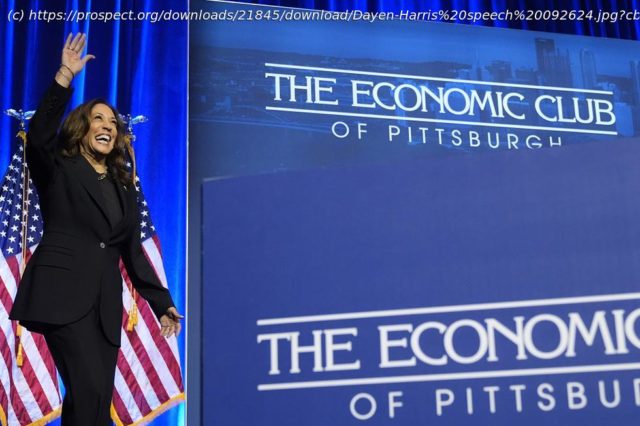Her speech on the economy was guarded. The details laid out by the campaign paint a brighter picture.
One of the moments that stood out in Kamala Harris’s big speech at the Economic Club of Pittsburgh on Wednesday was when she offered tax credits to manufacturing firms that protect American jobs. And when she called for increasing investment in public-sector research and development agencies. And when she vowed to stockpile critical minerals key to the energy transition and national security. And when she said she would take on China’s forced technology transfer and intellectual-property theft. And when she endorsed Buy America requirements in procurement and contracting. And when she said that investments in manufacturing would be offset by preventing operatic accounting strategies big corporations use to hide money overseas.
Or rather, those moments stood out from the fact sheet the Harris campaign sent around after the speech. None of them actually appeared in the speech itself. But like many a corporate retreat, the deliverables looked a little better than what the CEO had to say.
The audiences are different, of course. The speech was billed as a way to display an animating vision behind the “New Way Forward” headlines the campaign has foregrounded. Because Harris got such a late start campaigning, she doesn’t have the years of consistent messaging native to most presidential candidates. And she is hypersensitive about being tagged as a radical, both to the voting public and to the donor base that has driven up her fundraising.
Trying to both lock in trust and dispel mischaracterizations, to both pitch toward the undecided voter and maintain the hype from the base that accompanied her substitution for Joe Biden in the race, is a real high-wire act. It leads to cockeyed statements like quoting Franklin Roosevelt’s desire for “bold, persistent experimentation” (to get out of the Depression, in his case) with a promise for “practical solutions” and “pragmatic” approaches, which may be virtuous but are less than bold. It leads to boasting of the Biden-Harris record while also rhetorically shedding it. It leads to shaking her head at the largest corporations making “record profits” and demeaning Donald Trump for making the economy only work “for those who own the big skyscrapers, not those who build them,” while also seeking an “active partnership between government and the private sector” to “fully unlock economic opportunity.”
It’s just an awkward fit. One that wouldn’t be so awkward if there wasn’t this need to make up for lost time and overcompensate.
I should say that the last 35 years of presidential politics—a pretty good run for Democrats, nearly all of them wins in the popular vote—have taught us that populist economics sells in campaigning. Bill Clinton said that people who work hard and play by the rules can get ahead; Al Gore took the people vs. the powerful to a comeback win; and Barack Obama, struggling under the weight of a stagnant economy, obliterated Mitt Romney as a corporate ghoul. You see wisps of this in the Harris approach, aligning Trump with the wealthy and foregrounding the needs of the middle class. But it’s so larded up with paeans to innovation and “emerging technologies” like blockchain that it’s hard to take in.
The fact sheet doesn’t have to make such somersaults and splits. It can just string together what the Harris-Walz administration wants to do to reach its goals.






